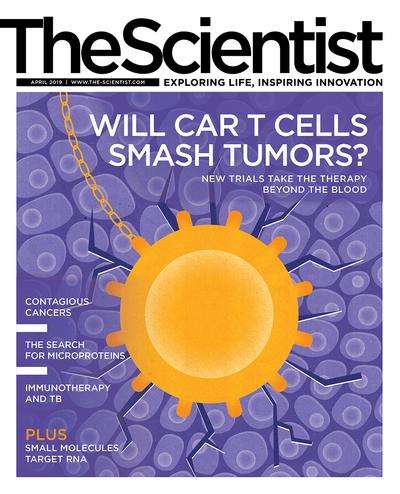ABOVE: TELLTALE TARGETS: T cells (one pictured above) can be trained to seek and destroy antigens specific to tumors.
MODIFIED FROM FLICKR, NIAID
EDITOR’S CHOICE GENETICS & GENOMICS
The paper
C.M. Laumont et al., “Noncoding regions are the main source of targetable tumor-specific antigens,” Sci Transl Med, 10:eaau5516, 2019.
In pursuit of safe and effective cancer therapies, researchers have sought to identify antigens that are found on cancer cells but not on healthy cells. The quest for such tumor-specific antigens (TSAs) has largely focused on predicting mutated peptides from cancer cell genomes of individual patients.
This approach makes a research project out of each patient, says Claude Perreault, an immunologist at the University of Montreal. “I think you’re asking something that is impossible,” he adds. So Perreault and colleagues took a different tack. They used mass spectrometry to identify peptides on the surfaces of different types of...
The researchers then scoured the mouse and human genomes to figure out where the peptides came from. “We told ourselves, ‘Let’s look everywhere,’” says Perreault. They found that 90 percent of the TSAs were encoded in “junk” DNA, regions previously thought to be noncoding. To test if the TSAs would activate mice’s immune systems, the researchers injected the antigens along with mouse T-lymphoblastic lymphoma cells. For some TSAs, the immune response was relatively weak. But others elicited an impressive response, with one giving mice a 100 percent survival rate.
The goal is to package a bunch of TSAs into a vaccine that prompts killer T cells to attack a particular type of cancer. TSA-based vaccines will need to be compared to conventional vaccines and treatments that use more-traditional mutated antigens in further studies, says Neeha Zaidi, a cancer immunologist at Johns Hopkins University who was not involved with the work. But for cancers without many known antigens, this approach “could be really, really game changing,” she says.
Interested in reading more?






